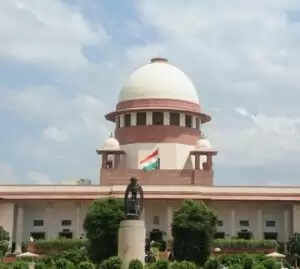Supreme Court to Review Controversial Waqf Amendment Act: What’s at Stake?
Supreme Court Set to Hear Waqf Amendment Act Challenges

New Delhi: The Supreme Court is scheduled to examine several petitions contesting the constitutional legitimacy of the Waqf (Amendment) Act, 2025, on Wednesday.
According to the court's official schedule, a bench led by Chief Justice Sanjeev Khanna, along with Justices Sanjay Kumar and KV Viswanathan, will address the issue on April 16 at 2 PM.
Numerous petitions have been submitted to the Supreme Court questioning the recent modifications made to the Waqf Act of 1995.
In response to requests for a stay on the Waqf (Amendment) Act, 2025, the Union government has lodged a caveat with the Supreme Court. This caveat acts as a notification to the court from a party involved in litigation, ensuring they are heard if a stay order is anticipated.
Additionally, several states governed by the BJP, including Haryana, Maharashtra, Madhya Pradesh, Rajasthan, Chhattisgarh, Assam, and Uttarakhand, have approached the Supreme Court to support the Waqf (Amendment) Act, 2025.
Following the passage of the legislation by Parliament in early April, the Congress party declared its intention to challenge the Waqf (Amendment) Bill (now an Act after receiving Presidential assent) in the Supreme Court, asserting that it undermines the Constitution's fundamental structure and aims to 'polarize' and 'divide' the nation along religious lines.
Conversely, the government argues that millions of impoverished Muslims will gain from this legislation, asserting that it does not harm any individual Muslim.
Minority Affairs Minister Kiren Rijiju emphasized that the law does not interfere with Waqf properties, stating that the Modi administration operates under the principle of 'Sabka Saath and Sabka Vikas'.
In his petition to the Supreme Court, Congress MP and party whip in Lok Sabha Mohammad Jawed argued that the amendments breach Articles 14 (right to equality), 25 (freedom of religion), 26 (management of religious affairs), 29 (minority rights), and 300A (right to property) of the Constitution.
Another petition from All India Majlis-e-Ittehadul Muslimeen (AIMIM) leader Asaduddin Owaisi claimed that the contested amendments are 'ex facie violative of Articles 14, 15, 21, 25, 26, 29, 30, 300A of the Constitution of India and manifestly arbitrary'.
Other petitioners include the Association for Protection of Civil Rights, AAP leader Amanatullah Khan, Maulana Arshad Madani of Jamiat Ulema-i-Hind, the All India Muslim Personal Law Board (AIMPLB), the Social Democratic Party of India (SDPI), the Indian Union Muslim League, Taiyyab Khan Salmani, and Anjum Kadari, all challenging the constitutional validity of the Waqf (Amendment) Act 2025.
The term 'Waqf' is derived from Islamic law and refers to an endowment made by a Muslim for charitable or religious purposes, which can include mosques, schools, hospitals, or other public institutions.
